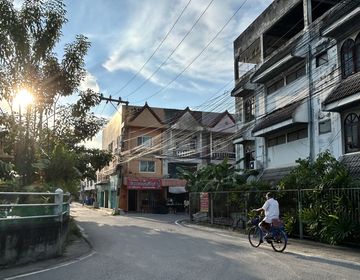Tuesday Thai Lessons
Today, I was handed a menu that was written completely in Thai and was able to decipher enough of it to order fried rice with chicken and actually ended up with fried rice with chicken, a sign that my Thai language ability is improving. My limited Thai language skills and inability to read the language has been far more of a hindrance than I anticipated. In my first few weeks, I struggled to complete the most basic tasks. Ordering food was complicated by the fact that I could not read the menus. I was regularly lost because I could not to read the street signs and could not see the mountains. This constant discomfort, and my love of language, has fueled my unrelenting determination to learn this language.
I began studying consonant flashcards and memorizing survival phrases in the months before I moved here. I would listen to language podcasts on the way to and from work and furiously practiced my rolled r’s in the car. Though meaningless to me at the time, I would listen to Thai Top 50 playlists to accustom my ears to the sounds, and the tones, which were completely new to me as a native English speaker. Because the Thai language is so significantly different from English, the learning curve has been steep. Without anyone to speak Thai with, there was only so much of a tonal language that I could teach myself, and when I arrived, I knew only the basics.
One of the first things I did when settling into life here was to hire a language tutor. Through mutual acquaintances, I was connected with a teacher from another school who agreed to teach me. When I found out we shared another language, French, I was over the moon.
My tutor is Thai and speaks English with a polished British accent. He has a movie reference for every situation, most of which go over my head, and I end up googling actors after each lesson. He dreams of visiting Hollywood. Sometimes we take a tea break halfway through the lesson, and often we cook dinner together afterwards. We talk about films and music and travel, our conversation drifting between languages.
On Tuesday afternoons, we spend an hour building my vocabulary and correcting my pronunciation. I always come with a list of questions, words and phrases I heard throughout the week and language mysteries I cannot puzzle out. He is patient and answers all of my technical grammar questions borne of a language fascination and an English degree. It helps that we share multiple languages, so aspects of Thai that do not fit into my English language map he can often explain by comparing to French, for example, the way “to make” and “to do” share a single verb in both languages.
Last week, we spent the hour practicing bank phrases in anticipation of my attempt at opening a Thai bank account. Determined to complete this task without a translator, I asked him to help me prepare. We drilled my pronunciation of key phrases and roleplayed the conversation so that I would understand the banker’s responses to me. He gave me vocab lists to study, and when I marched into the bank and said, “I would like to open a bank account” in Thai, they understood what I needed. Between my Thai and the banker’s English, I was able to open an account and left proud of myself and excited to share my success with my tutor.
I study every day, often waking up early to practice before school. I have books and flashcards and vocab lists that I pore over in my free time. I take every menu and every sign as an opportunity to practice sounding out words. Every day, I understand more of morning assembly. I still have so far to go, so much of the language that I have not even begun to uncover. I still stumble through most social interactions. Learning a new language can be frustrating, but I am encouraged by my progress and invigorated by the challenge. There is an entirely new world in the Thai language, and I am determined to experience it.
Related Posts

A Day in My Life Teaching Kindergarten
Before moving overseas, one question that constantly circled my mind was: What will my everyday life look like? I had lots of ideas, but I quickly realized it's impossible to... keep reading

One Month in Thailand: The Stages of Adjustment
Coming up on my one month of living and working in Thailand, here are some of my tips and tricks for adjusting to your new life here (based on my experience)

A School Day in My Life Teaching Pre-K
A month or so before moving to Thailand, I got the email that I was assigned to teach pre-kindergarten. I was ecstatic – I’d been hoping I’d get placed working... keep reading
